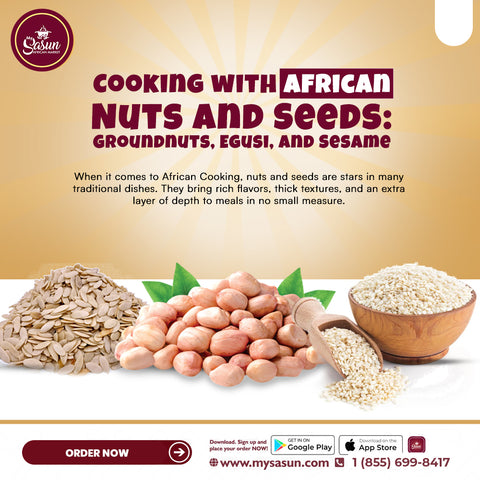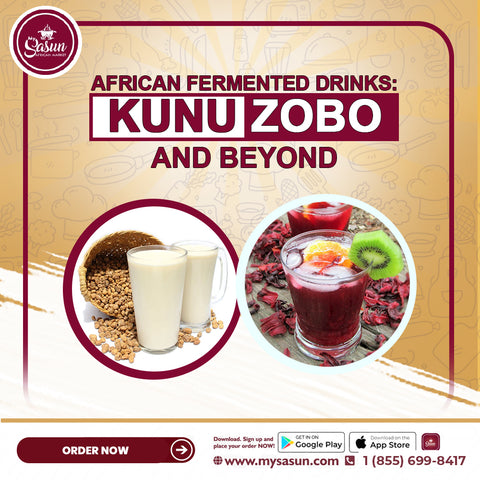When it comes to African Cooking, nuts and seeds are stars in many traditional dishes. They bring rich flavors, thick textures, and an extra layer of depth to meals in no small measure. There is the creamy, nutty richness of groundnuts for instance; the unique thickness of Egusi and for the sake of this blog, there is the subtle crunch of sesame seeds— these ingredients are integral to creating some of Africa’s most beloved dishes.
Whether you’re familiar with these staples or just getting started, this guide will take you through how to cook with groundnuts, egusi, and sesame seeds. You’ll learn what makes them so special, how they’re used through different regions, and how they can be incorporated into your own meals.
Also Read: 13 African Foods That Can Help You Gain Weight Fast
African Nuts and Seeds
Nuts and seeds aren’t just used to enhance flavors, they’re packed with healthy fats, proteins, and essential vitamins. They’re also used in a wide variety of ways in African kitchens:
-Thickening soups and stews
-Creating sauces;
-Bringing richness and balance to the bold flavors of African spices, meats, and vegetables etc.
Let’s dive into each one and explore how they shape our dishes.
1. Groundnuts (Peanuts)

Groundnuts, more commonly known as peanuts outside of Africa, are a staple ingredient throughout the continent. They’re particularly prominent in West and Central African cooking, where they’re used to make rich stews, sauces, and snacks. Groundnuts are known for their creamy, nutty flavor and are incredibly versatile, they can be used whole, ground, or turned into peanut butter.
Popular Groundnuts Dishes
Groundnut Stew (Mafé)

In West Africa, one of the most famous dishes featuring groundnuts is Groundnut Soup (also called Mafé in Senegal and Nkate Nkwan in Ghana). This hearty stew is made with ground peanuts that are simmered with tomatoes, onions, and spices, along with either chicken, beef, or fish. The result is a rich, creamy sauce that’s perfect for serving with rice or fufu.
Also Read: 10 HEALTH BENFITS OF CASHEW NUTS
Kuli-Kuli

Another popular use for groundnuts is in the snack Kuli-Kuli. This crunchy, savory treat is made from ground peanuts that are roasted, ground into a paste, and then fried. Kuli-Kuli is a common street food in West Africa, often enjoyed with a cold drink or crushed over meals/meat to add a delicious crunch.
Nutritional Value of Groundnuts
Groundnuts are high in protein and healthy fats, so they are a great option for those looking to add more plant-based protein to their diet. They’re also rich in vitamins and minerals, including vitamin E, niacin, and magnesium, which support heart health, brain function, and overall vitality.
2. Egusi (Melon Seeds)

Egusi seeds, derived from a type of melon grown in West Africa, are a key ingredient in many traditional Nigerian, Ghanaian, and Cameroonian soups. When ground, Egusi seeds have a slightly nutty, creamy taste and are often used to thicken soups and stews, giving them a hearty, comforting texture.
Also Read: 15 Porridges and Puddings from the Heart of Africa
Popular Egusi Dishes
Egusi Soup

The most famous dish made with Egusi is Egusi Soup, a beloved staple in Nigeria and across West Africa. This rich, thick soup is made by cooking ground Egusi seeds with palm oil, meat (such as goat or beef), stockfish, and leafy greens like spinach or fluted pumpkin leaves. Egusi Soup is commonly served with fufu, pounded yam, or garri.
Ogbono and Egusi Soup

In some variations, Egusi is combined with Ogbono (wild mango seeds) to create a thick, hearty soup. The combination of Egusi’s creamy texture and Ogbono’s sliminess gives the dish a unique consistency that’s enjoyed with starchy sides like pounded yam or eba.
Nutritional Value of Egusi
Egusi seeds are packed with healthy fats and protein, making them a nutritious addition to any meal. They’re also a good source of essential vitamins like vitamin A and folate, and they provide minerals like calcium, potassium, and magnesium, which are important for bone health and muscle function.
3. Sesame Seeds (Benne)

Sesame seeds, known as Benne in some African regions, are small but mighty when it comes to flavor. These seeds are native to both West and East Africaand they have a long history of use in African cooking. Their mild, nutty flavor and delicate crunch make them a versatile ingredient, used in everything from sauces to snacks.
Also Read: How to Make the Perfect Pap/Akamu/Ogi
Popular Sesame Seeds Dishes
Tahini and Benne Sauce

While sesame seeds are often used whole, they’re also ground into a paste to make tahini, which is widely used in North African and East African dishes. In Ethiopia, sesame seeds are used to create a rich sauce known as Benne Sauce, which pairs beautifully with grilled meats and vegetables.
Sesame Seed Snacks

In West Africa, sesame seeds are often used to make crunchy snacks like Sesame Seed Brittle, where the seeds are mixed with sugar or honey, then toasted until crisp. These snacks are popular as both street food and a homemade treat.
Sesame Seed-Crusted Meats

In many African regions, sesame seeds are also used to coat meats or fish before frying or grilling. The seeds add a crunchy texture and enhance the overall flavor, creating a delightful contrast between the crispy exterior and the tender meat inside.
Also Read: Foods for Healthy Skin and Hair
Nutritional Value of Sesame Seeds
Sesame seeds are an excellent source of healthy fats, protein, and fiber. They’re also packed with minerals like calcium, iron, and zinc, which support strong bones, immune function, and energy production. Additionally, sesame seeds contain antioxidants that can help reduce inflammation and promote overall health.
Cooking Tips for African Nuts and Seeds
Now that you know how groundnuts, Egusi, and sesame seeds are used in African cooking, here are a few tips to help you get the best flavor out of these ingredients:
1. Roast for Richer Flavor
Roasting nuts and seeds before using them in your dishes can enhance their natural flavor. Whether groundnuts or sesame, lightly toasting the nuts or seeds in a dry pan before cooking will bring out their nutty aroma and add depth to your meal.
2. Grind Fresh for Maximum Flavor
For Egusi and sesame seeds, grinding them fresh right before use will ensure maximum flavor and texture. While you can buy pre-ground versions, freshly ground seeds offer a much more intense and fresh flavor that elevates your dish.
3. Store Properly to Keep Them Fresh
Nuts and seeds can go rancid if not stored correctly. To keep groundnuts, Egusi, and sesame seeds fresh, store them in an airtight container in a cool, dark place. If you’ve ground your seeds into powder or paste, keep them in the refrigerator to preserve their oils and prevent them from spoiling.
Also Read: TOP 17 NIGERIAN/AFRICAN SNACKS AND WHERE YOU CAN FIND THEM IN THE US AND CANADA
Rounding Off…
At My Sasun African Market, we offer the highest quality nuts and seeds so you can cook up your favorite African meals with confidence. Stock up on these essentials and start creating flavorful, nutritious dishes that capture the soul of African cooking today. See you next time!
FAQs
-
Can I use peanut butter instead of groundnuts in recipes?
Yes, you can use natural peanut butter as a substitute for groundnuts in stews like Groundnut Soup or Mafé. Just be sure to choose a peanut butter without added sugars or oils for the most authentic flavor.
-
How do I prevent my Egusi from clumping when cooking?
To prevent Egusi from clumping, you can mix the ground seeds with water or stock to form a paste before adding it to the soup. Stir frequently to ensure it blends smoothly with the other ingredients.
-
Are sesame seeds interchangeable with other seeds in African recipes?
While sesame seeds have a unique flavor, you can substitute them with other seeds like sunflower or pumpkin seeds in some recipes. However, the taste and texture will vary slightly.
-
How long do groundnuts and Egusi last?
When stored properly in an airtight container in a cool, dark place, groundnuts can last up to 6 months, while Egusi seeds (whole or ground) can last around 3-6 months. To extend their shelf life, you can refrigerate or freeze them, which helps preserve their oils and flavor.
-
Can I roast sesame seeds before using them in cooking?
Yes! Roasting sesame seeds before cooking enhances their nutty flavor and adds a nice crunch to your dishes. Simply dry roast them in a pan over medium heat for a few minutes until they turn golden brown. Be careful not to burn them, as they cook quickly.







Comments (6)
First, I want to complement this page administrator for creating this platform for us to express our feelings. Herpes is a serious and recurring disease which can’t be cured through drugs or injections by the American doctors but the best way to deal with herpes is by taking natural herbs medicine from DR. Akhimien is the greatest herbalist doctor in the world and there are only a few American doctors that know about this herbal medicine from Dr Akhimien.. I have read about Dr Akhimien the great herbalist doctor from Africa who can cure disease with his powerful herbal medicine. For the people suffering from the following diseases, Herpes, HIV/Aids, Cancer, Also, Hepatitis, Diabetes, Hpv, Infections ETC should contact him for his herbal medicine because I am a living testimony and I was cured of herpes. Although, I sent him what he requested and he sent me his medicine through the UPS courier delivery company which I took for 3 weeks. today when I went for a test I tested herpes negative. You can reach him through his email {drakhiniemodion@gmail.com} or WhatsApp him at +2349133157031 Or website is https://drakhiniemodion.wixsite.com/drakhimien
Hi Friends i am so glad to writing this article today to tell the world how Dr Akhimien cured my HSV VIRUS,i have been detected with HSV-1 AND HSV-2 since five years ago, ever since then my life has been in complete bizarre and agony,i have used so many drugs that was prescribed to me by several doctors,but it didn’t cure my HSV VIRUS neither did it reduce the pain,until a certain i was checking for solution in the internet,then miraculously came across Dr Akhimien the powerful herbalist that cure numerous individuals HSV-1 AND HSV-2 INFECTION,i explained everything to him and prepared a cure that cure my HSV-1 AND HSV-2 disease totally after receiving his herbal medicine, so my friends viewers why wait and be suffer when there is someone like Dr Akhimien that can cure any disease HIV/ CANCER/ HEPATITIS B VIRUS, you can contact him via Email: drakhiniemodion@gmail.com or WHATSAPP +2349133157031 GOD BLESS YOU ALL https://drakhiniemodion.wixsite.com/drakhimien
I would never have believed that cold sore herpes virus can be cured with ancient herbal medicine because I just tested negative for the second time since I finished drinking the medicine a herbal doctor sent to me, all the sores and blisters were gone immediately I started drinking the herbal meds, so I want you all to know that herpes virus can be cured with the right use of ancient herbal medicine so visit this herbalist called doctor excel on his Email: drahonsie00@gmail.com / WhatsApp: +2348039482367. https://drahonsie002.wixsite.com/dr-ahonsie https://www.facebook.com/drstellaherbalhome?mibextid=ZbWKwLThanks
World Rehabilitate Clinic has made a great impact treating and providing complete cure for patients with chronic illnesses.
Hello everyone, i have a very important information about herpes virus, i was a victim of hsv1&2 until i met doctor Ahonsie, it still feels like a dream to me. it has been two years now, i have not experience any breakout of herpes. I new about him through a post made on social media, a lady shares her experience and then i decided to contact him and ever since i contacted i was encourage and with no doubt i was cured from herpes simplex in just two weeks. He also treat other illnesses like HPV, HIV, CANCER, THYRIOD, PENIS ENLARGEMENT, and more contact him via Email: drahonsie00@gmail.com / WhatsApp: +2348039482367. https://drahonsie002.wixsite.com/dr-ahonsie https://www.facebook.com/drstellaherbalhome?mibextid=ZbWKwLThanks
My purpose out here today is to share this article to the world about how Doctor Odunga helped me in getting back my EX-boyfriend who broke up with me 4 months ago. I tried all I could to make him see reasons with me so that we can continue our relationship but he denied me. Thank God for giving me the thought of going into the internet for help, I searched properly and I saw different reviews of Doctor Odunga and I insisted on giving it a try by contacting him via what’s app on (+2348167159012). He gave me reason to live again and he prepared a spell and told me that my Ex-boyfriend will come back to me within 11 hours. Can you believe it, my EX-boyfriend came back to me, proposed to me and our wedding will be held soon. Contact him now!!! if you need any help. Email: odungaspelltemple@gmail.com and he does a lot of spells. Once again i want to say am very grateful for your help